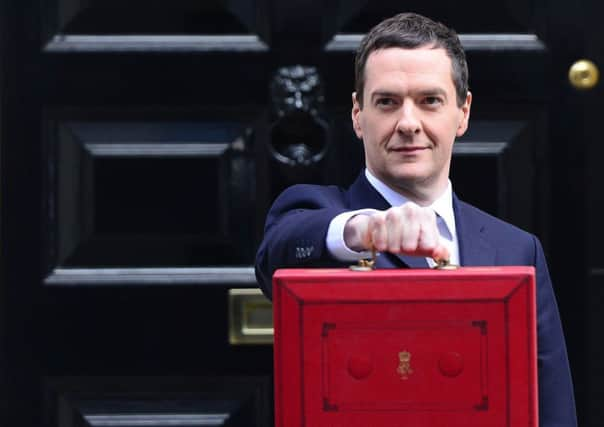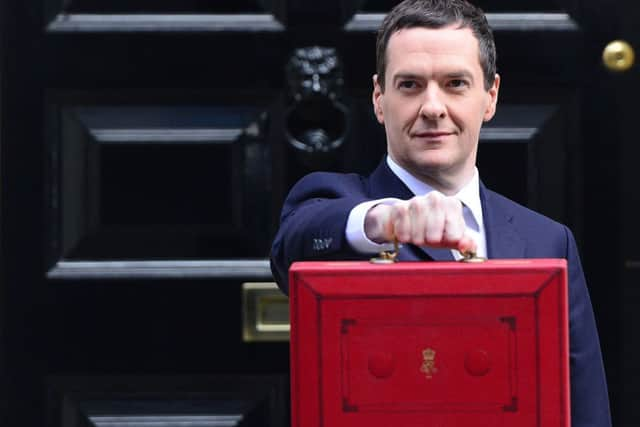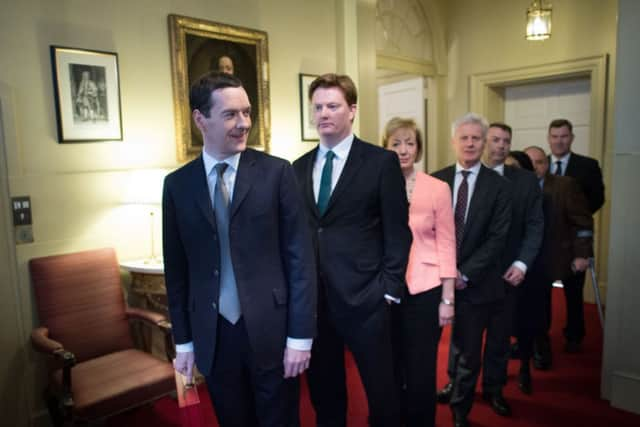‘End of austerity’ as Osborne budget woos savers and house buyers


In his final Budget before the general election, the Chancellor announced a new personal allowance which would mean 95% of all savers savers would pay no tax on their savings.
Advertisement
Hide AdAdvertisement
Hide AdAnd he said that he was creating a new help-to-buy ISA which would see the Government add £50 to every £200 first-time buyers put away towards a deposit.
He confirmed tax cuts via a rise in personal allowances, cut beer, cider and spirit duties, and again scrapped the fuel duty rise.
And the Chancellor said the “the sun is starting to shine” as he said the period of austerity would end a year earlier than forecast.
But Labour leader Ed Miliband, responding to the Budget speech, said there had never been such a large gap between the Chancellor’s rhetoric and the reality of people’s lives.
Advertisement
Hide AdAdvertisement
Hide AdHe condemned Mr Osborne for failing to mention investment in the NHS or public services.


And he told MPs: “This is a Budget people won’t believe from a Government that is not on their side - because of their record, because of their instinct, because of their plans for the future.”
The Chancellor also announced an extension to the Humber Enterprise Zone, underpinning its role as a major location for manufacturing and offshore wind energy jobs.
There is also some £11m made available for a series of “tech incubators” to help new firms set up on Manchester, Leeds and Sheffield, as well as support for a new financial tech incubator in Leeds to capitalise on the region’s financial sector.
Advertisement
Hide AdAdvertisement
Hide AdSome £500,000 is expected for a scheme to help drivers use their mobile phones to arrange car sharing and other traffic cutting measures.


The measures follow the Chancellor’s commitment to turn the North’s towns and cities into an economic “powerhouse” that can compete on the global stage.
Nationally, the Chancellor will bring in new digital tax accounts for individuals and small businesses.
Digital tax accounts – accessible at any time from a smartphone, computer or iPad - will replace traditional tax returns for all tax issues.
Advertisement
Hide AdAdvertisement
Hide AdMr Osborne armed himself with a pre-election war chest of up to £6 billion heading into the Budget as the outlook for UK public finances looks set for an upgrade.
Economists say the tumbling oil price, which has dragged down inflation and beefed up prospects for a consumer spending boost to the economy, will help create a rosier fiscal picture for Mr Osborne.
But the Chancellor claimed the Government’s economic strategy was paying off.
To Tory cheers he announced that he would meet his promise made in 2010 that debt would be falling as share of national income by the end of the parliament.
Advertisement
Hide AdAdvertisement
Hide AdHe said that a combination of lower welfare bills, falling interest rates, and further sales for the bailed out banks meant borrowing was set to fall faster than forecast.
“The hard work and sacrifice of the British people has paid off. The original debt target I set out in my first Budget has been met,” he said.
“We will end this parliament with Britain’s national debt share falling. The sun is starting to shine - and we are fixing the roof.
“Because the national debt share is falling a year earlier than forecast at the Autumn Statement - the squeeze on public spending ends a year earlier too.
Advertisement
Hide AdAdvertisement
Hide Ad“In the final year of this decade, 2019-20, public spending will grow in line with the growth of the economy.
“We can do that while still running a healthy surplus to bear down on our debt.”
In a nod to the May 7 poll, he said Britain was facing a “critical choice” as he highlighted economic successes.
Mr Osborne said the Office for Budget had ticked up its growth forecast for this year - to 2.5% compared to the 2.4% it was predicting at the time of the Autumn Statement in December.
Advertisement
Hide AdAdvertisement
Hide AdGrowth will also be slightly higher next year at 2.3% as against a previous forecast of 2.2%, he said.
He told MPs: “Today, I report on a Britain that is growing, creating jobs and paying its way. We took difficult decisions in the teeth of opposition and it worked - Britain is walking tall again.”
He said that after a collapse greater than almost any country five years ago, in the last year the UK has grown faster than any other major advanced economy.
He went on: “Five years ago, millions of people could not find work. Today, I can report: more people have jobs in Britain than ever before.
Advertisement
Hide AdAdvertisement
Hide Ad“Five years ago, living standards were set back years by the Great Recession. Today, the latest projections show that living standards will be higher than when we came to office.
“Five years ago, the deficit was out of control. Today, as a share of national income it is down by more than a half.”
And he added: “The critical choice facing the country now is this: do we return to the chaos of the past? Or do we say to the British people, let’s go on working through the plan that is delivering for you?”
He said the OBR was predicting that debt as a share of GDP will fall from 80.4% in 2014-15 to 71.6% in 2019-20.
Advertisement
Hide AdAdvertisement
Hide AdMr Osborne said that, under the new personal savings allowance, the first £1,000 earned in interest would be completely tax-free - abolishing savings tax for 17 million people.
“People have already paid tax once on their money when they earn it. They shouldn’t have to pay tax a second time when they save it,” he said.
“At a stroke we create tax-free banking for almost the entire population.”
He said the new help-to-buy ISA would be accompanied by a new “fully flexible ISA” giving savers complete freedom to take money out, and put it back in later in the year, without losing any of their tax-free entitlement.
Advertisement
Hide AdAdvertisement
Hide AdTogether with the plans to allow pensioners to cash in their annuities, he said the Government was conducting a “savings revolution”.
As expected, he said the personal tax-free allowance will go up to £10,800 next year, rising to to £11,000 the year after.
And he said that, for the first time in seven years, the higher rate tax threshold would go up by more than inflation, rising from £42,385 this year to £43,300 by 2017-18.
A limited devolution deal giving the Leeds city region more control over its own affairs was also unveiled by the Chancellor.
Advertisement
Hide AdAdvertisement
Hide AdAn early copy of the document seen by The Yorkshire Post includes a bigger say for the region over skills funding and a lead role in the way support is given to local businesses.
The city region will have more control over the way key assets held by the Homes and Communities Agency, including key development sites, are used.
He said a provisional agreement had been struck to allow Greater Manchester to keep 100% of the additional growth in local business as part of the Government’s drive to build a “Northern powerhouse”.
A similar deal was being offered to councils in Cambridge and the surrounding area, while the Midlands would benefit from a £60 million investment in the new energy research accelerator
Advertisement
Hide AdAdvertisement
Hide AdThe South West will get a new rail franchise, bringing new intercity express trains, while Wales would see the Severn Crossing toll rates cut, with the higher band for vans and buses abolished altogether.
There is also a number of commitments to future discussions in areas such as joint commissioning of the work programme - the Government’s main tool for getting the long-term unemployed back to work - and greater control over local transport schemes.
Future devolution to the Leeds City Region will also be accompanied by consultations on changing the way the area is governed, the document says. The Chancellor has been pressing the area to adopt a Boris Johnson-style elected mayor in return for much more wide-ranging powers.
The deal is likely to be presented by the Government has a major handover of powers from Whitehall to West Yorkshire but received more cautiously in the region.
Advertisement
Hide AdAdvertisement
Hide AdWest Yorkshire Combined Authority chairman Peter Box said: “The deal is disappointing and doesn’t match the scale of our ambition.
“It undermines the Government’s claim to want a strong ‘northern powerhouse’. If we are to turn that into reality we need real devolution, including fiscal devolution, to enable us to bring about a step change in the city region’s economy.”
The Yorkshire Post further understands that a plan to transform the North’s transport has been presented to the Treasury and could also feature in today’s Budget.
George Osborne launched Transport for the North - a body bringing together councils, the Department for Transport, the Highways Agency and others - last year to come up with a plan to overhaul transport as part of his goal of turning the North into an “economic powerhouse”.
Advertisement
Hide AdAdvertisement
Hide AdThe Yorkshire Post revealed earlier this month that officials had been told to re-write the plan after a first draft was deemed too vague and lacked timetables for delivery of particular projects.
The Government is expected to say more about the plan this week and it could feature in Mr Osborne’s Budget today.
It is unlikely the Government will immediately commit large sums to specific projects but money is expected to be made available to develop schemes further.
READ MORE...